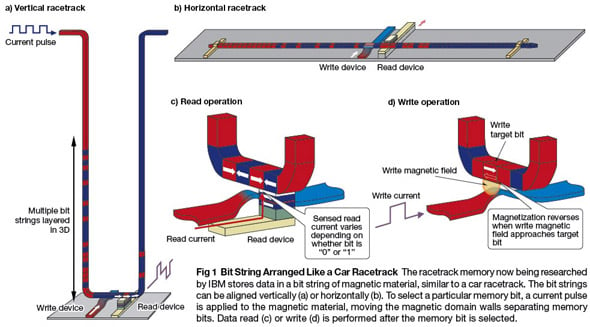IBM's Racetrack Memory One Step Closer To Reality
IBM is one of a number of companies working on a next-generation storage memory project. A recent discovery at Texas A&M University is a step forward for the company's racetrack memory. Racetrack memory relies on a nanowire arranged perpendicular to the chip. Current pulses across the nanowires allow data to be shifted as necessary. The Texas team has discovered a way to pulse the current much more efficiently and quickly, which could definitely help future racetrack devices to compete in the marketplace.

In theory, racetrack memory could be the Holy Grail of storage, capable of replacing both traditional hard drives and SSDs simultaneously. Flash-based storage will never be able to meet that goal; current leakage at sub-22nm already poses a serious problem. Racetrack memory could solve multiple problems simultaneously; commercial implementations could offer hard drive-level density. Performance and reliability would both be far superior to today's SSDs.
We've seen some exuberant predictions of a racetrack memory coup in just 5-7 years but that assumption is a bit too optimistic. To date, IBM has demo'd a three-bit racetrack configuration—it's a start, but it's scarcely ready to ship. The fact is, racetrack memory has to hit a certain trifecta of price, performance, and reliability to have any hope of displacing more traditional storage mediums. Even with top-level engineers aboard, this isn't a sure bet.
FeRAM is a good example of how a potentially superior memory technology can fail to penetrate the market. Ferromagnetic RAM uses less power than conventional flash, is far more reliable (in terms of read/write cycles and data longevity), and offers much faster read/write performance. Unfortunately, FeRAM's low memory density and high cost have torpedoed the standard's chance of taking market share from existing NAND flash. Making matters worse is the fact that corporate R&D is typically sunk into extending and improving current technologies, as opposed to attempting to reinvent the wheel.
We're absolutely in favor of a storage solution that offers better-than SSD performance with HDD capacities, but it's a long, rocky road between where alternative memory technologies are today and where they'd need to be to begin widescale deployment.

In theory, racetrack memory could be the Holy Grail of storage, capable of replacing both traditional hard drives and SSDs simultaneously. Flash-based storage will never be able to meet that goal; current leakage at sub-22nm already poses a serious problem. Racetrack memory could solve multiple problems simultaneously; commercial implementations could offer hard drive-level density. Performance and reliability would both be far superior to today's SSDs.
We've seen some exuberant predictions of a racetrack memory coup in just 5-7 years but that assumption is a bit too optimistic. To date, IBM has demo'd a three-bit racetrack configuration—it's a start, but it's scarcely ready to ship. The fact is, racetrack memory has to hit a certain trifecta of price, performance, and reliability to have any hope of displacing more traditional storage mediums. Even with top-level engineers aboard, this isn't a sure bet.
FeRAM is a good example of how a potentially superior memory technology can fail to penetrate the market. Ferromagnetic RAM uses less power than conventional flash, is far more reliable (in terms of read/write cycles and data longevity), and offers much faster read/write performance. Unfortunately, FeRAM's low memory density and high cost have torpedoed the standard's chance of taking market share from existing NAND flash. Making matters worse is the fact that corporate R&D is typically sunk into extending and improving current technologies, as opposed to attempting to reinvent the wheel.
We're absolutely in favor of a storage solution that offers better-than SSD performance with HDD capacities, but it's a long, rocky road between where alternative memory technologies are today and where they'd need to be to begin widescale deployment.

